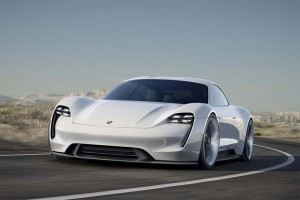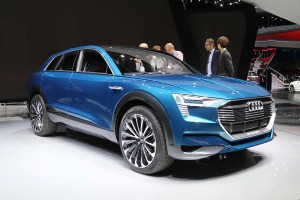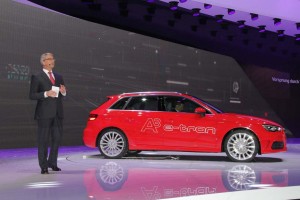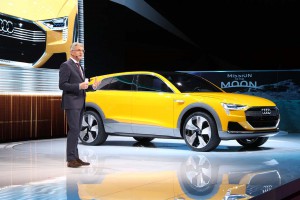As the brand shifts attention away from its diesel line-up to new, greener technologies, Audi CEO Rupert Stadler wants to have three pure battery-electric models in the line-up by 2020, even if that means dropping some conventional models to come up with the necessary R&D dollars.
Audi has already confirmed plans to launch a battery-electric SUV by 2018 and, in a new interview with German newspaper the Heilbronner Stimme, Stadler confirmed the maker wants 25 to 30% of its total sales to come from electrified models by 2025.
In the wake of parent company Volkswagen AG’s diesel emissions scandal, Audi and other VW brands have been shifting emphasis to battery-based models. Porsche, which is developing the Mission E electric sports car, said on Tuesday that it now expects to create 40% more jobs to handle that project than originally planned.
All told, the various VW brands are expected to launch as many as 30 plug-based models over the next decade, a figure that covers everything from the little battery-electric Volkswagen e-Up to the big Bentley Bentayga plug-in hybrid coming next year, as well as the Porsche and Audi models.
The development costs are expected to be significant, and Audi CEO Stalder told the German newspaper that it will require juggling some of the maker’s product plans to come up with the necessary cash.
For one thing, he said, “We have discussed what would happen if we dropped the two-door version of the A3. I think we would barely lose any customers. We’d rather invest the money that is freed up in new models and other derivatives.”
The push into battery propulsion is being driven by a number of factors. For one thing, there’s the damage all of the VW brands have taken from the maker’s diesel emissions scandal. Parent VW has admitted rigging the 2.0- and 3.0-liter diesel engines used on more than 10 million Volkswagen, Audi and Porsche models in recent years. That scandal is ultimately expected to cost the company well in excess of $20 billion, including a $15 billion deal with U.S. regulators.
(Judge expected to approve $15 bil VW diesel deal. Click Here for the latest.)
Then there are the tough new emissions and mileage standards being implemented in key markets around the world. China, struggling to cope with worsening air pollution problems, is pressing manufacturers to make the switch to battery power. As its largest global market, Audi will clearly need to comply.
The challenge will be to come up with battery-based models that offer the same attributes as conventional gas and diesel vehicles. Falling battery prices should help, industry experts believe. Audi has already said it will deliver at least 300 miles of range with the new Q6 e-tron.
Set to be produced at Audi’s new plant in Mexico, the electric SUV will be the first of the planned three models.
Audi’s push into battery-electric vehicles could pose a particular challenge to Tesla which recently added the Model X battery SUV to its line-up. It will introduce the more mainstream Model 3 sedan late next year and, as part of the company’s new “Master Plan, Part Deux,” CEO Elon Musk last week revealed plans to add other electric models, including a smaller SUV and a battery pickup.
(For more on the Tesla Master Plan, Click Here.)
Along with battery-electric vehicles, Stadler told the Heilbronner Stimme that his company is working on hydrogen fuel-cell vehicles – h-trons in Audi lingo. But there are more challenges to making a successful business case than with battery technology.
“That is less a question of technology, we are already quite good at that,” he said. “It’s rather going to be a question of infrastructure.”
Currently, there are few available hydrogen pumps, though there is a push to expand the infrastructure in some parts of the world, notably Germany, Japan and the State of California.
In his interview, Stadler noted that Audi is also moving forward on the development of autonomous vehicles. It has been active in that field for more than a decade, and is setting up a dedicated subsidiary, SDS Company to help commercialize the technology.

Workers at Porsche's Zuffhausen plant in Germany agreed to wage cuts in order to get the job of building the new Mission E.
“This is about a robot car that may not even need a steering wheel or pedals, so it’s ideal for urban traffic,” he said, without offering a specific target date for bringing such a vehicle to market.
The first fully autonomous vehicles could make their debut early in the next decade, but there is strong debate over the timing of truly driverless vehicles. Some experts believe they’ll be available before 2030, but others believe it will take years longer to work out all the technical challenges.
As for the latest news on its Mission E project, Porsche now says it will create 1,400 jobs for the Mission E sports car project, up from the original plan of 1,000. About 90% of the workers will be based at the headquarters plant in Zuffenhausen, Germany. Porsche is also building a special paint line and assembly line for the Mission E.
(Used car buyers get charged up about hybrids, plug-ins and EVs. Click Here for the story.)



